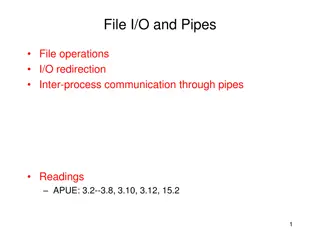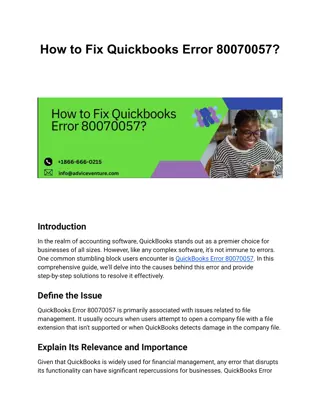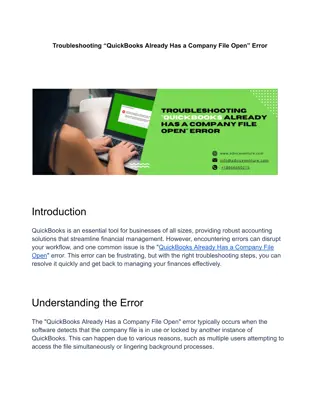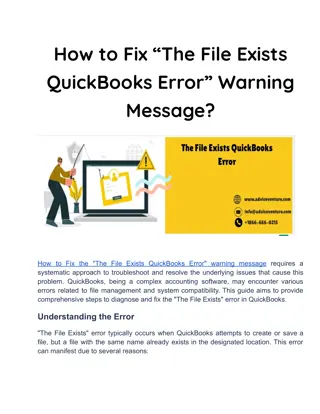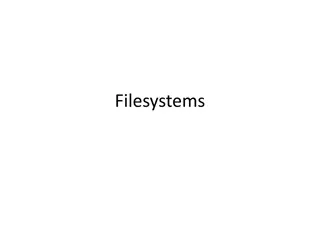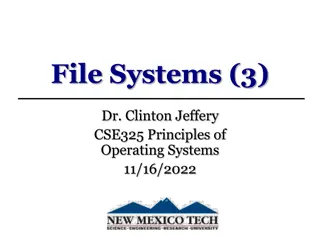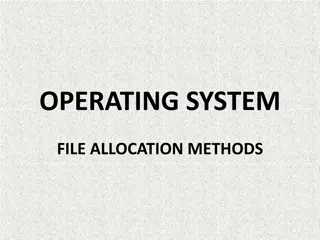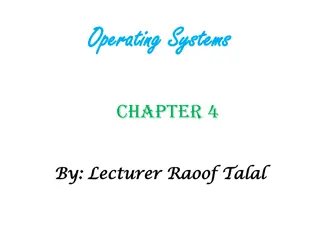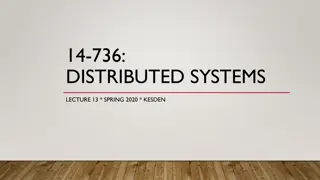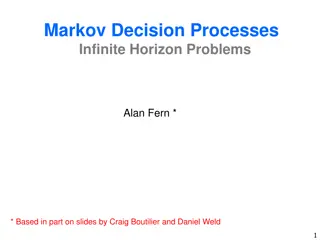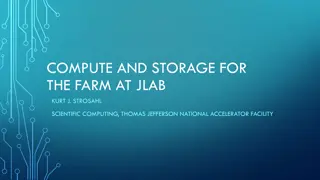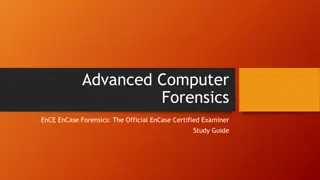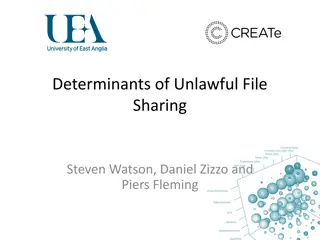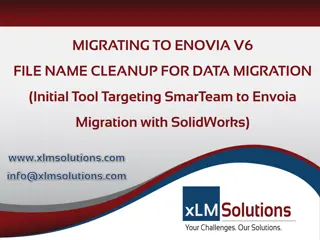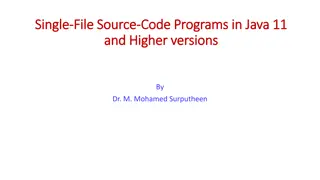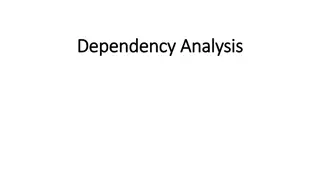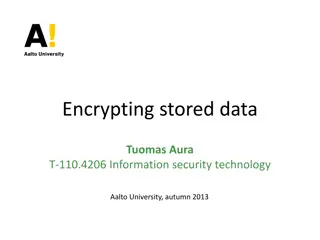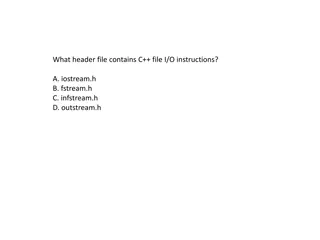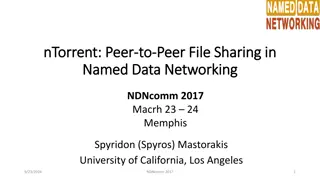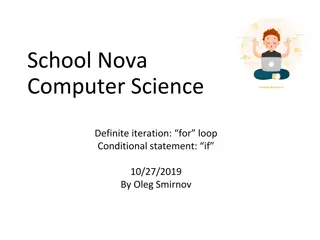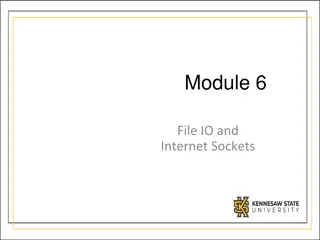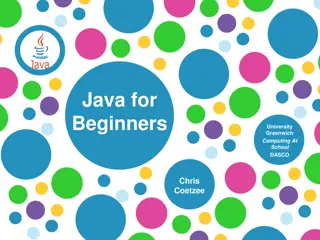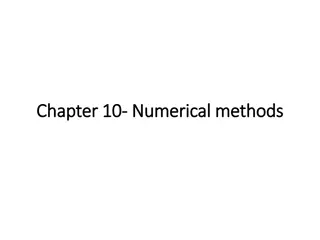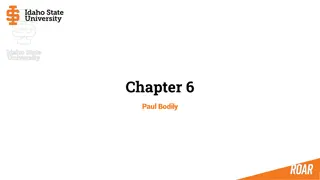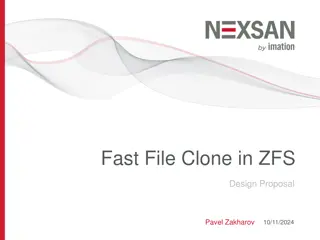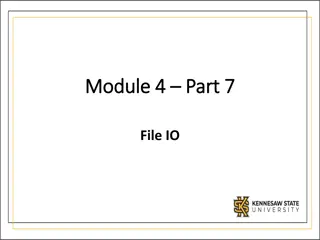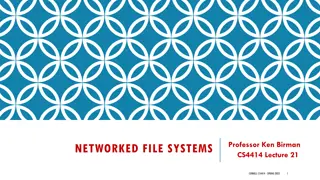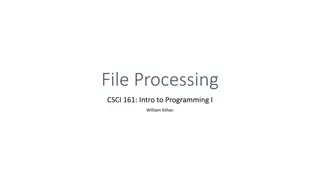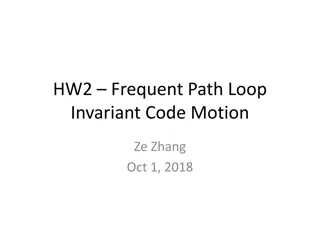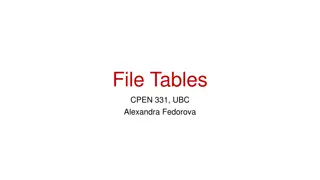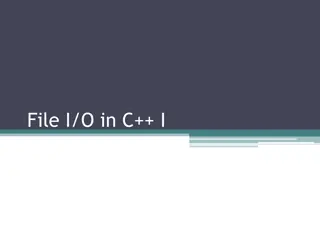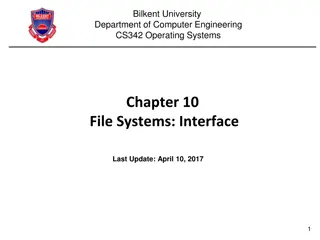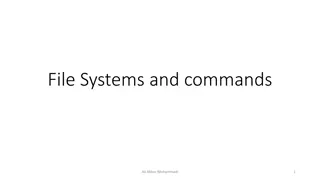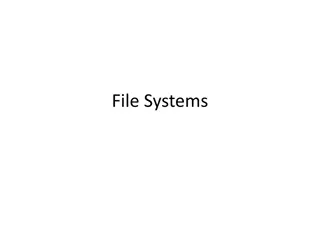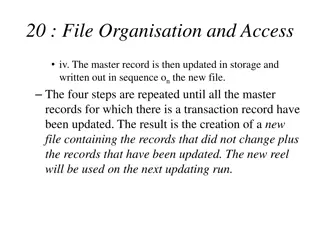Understanding File I/O and Inter-Process Communication Through Pipes
Delve into the intricacies of file operations, I/O redirection, and inter-process communication through pipes as discussed in the readings of "Advanced Programming in the Unix Environment" (APUE). Explore data structures for open files, file descriptor tables, implications of data structures, system
4 views • 18 slides
Faculty File Construction Workshop Year 2 Updates 2023
Explore the updates for the Faculty File Construction Workshop Year 2, including important resources, faculty plan requirements, and the purpose of decision file procedure. Learn about the required second-year file content and self-evaluation executive summary for faculty evaluation procedures at St
1 views • 18 slides
How to Fix Quickbooks Error 80070057?
How to Fix Quickbooks Error 80070057?\nQuickBooks Error 80070057 can disrupt financial management. It occurs due to file extension issues or data damage. Symptoms include inability to open files and error code display. Causes involve incorrect file extensions or firewall settings. Diagnostic tools l
1 views • 5 slides
Troubleshooting “QuickBooks Already Has a Company File Open” Error
Troubleshooting \u201cQuickBooks Already Has a Company File Open\u201d Error\nEncountering the \"QuickBooks Already Has a Company File Open\" error? This common issue disrupts your workflow but can be fixed. Start by checking for multiple instances of QuickBooks and restarting your computer. Ensure
1 views • 6 slides
How to Fix “The File Exists QuickBooks Error” Warning Message
How to Fix the \"The File Exists QuickBooks Error\" warning message requires a systematic approach to troubleshoot and resolve the underlying issues that cause this problem. QuickBooks, being a complex accounting software, may encounter various errors related to file management and system compatibil
0 views • 5 slides
Understanding Filesystems: A Comprehensive Overview
File systems provide a structured approach to storing and organizing data on secondary storage devices. They involve logical organization of files, directories for grouping related files, sharing data between users, and managing permissions. Files contain data with attributes like size, ownership, a
3 views • 29 slides
Understanding File Allocation Strategies in Operating Systems
Explore various file allocation schemes like extent-based systems, linked allocation, file allocation table (FAT), indexed allocation, and combined schemes used in operating systems. Learn about their pros and cons, including details on maximum file size calculations based on disk block sizes and po
0 views • 20 slides
Operating System: File Allocation Methods
File allocation methods in operating systems determine how files are stored in disk blocks. The main methods include Contiguous Allocation, Linked Allocation, and Indexed Allocation. Contiguous Allocation involves allocating blocks in a contiguous manner for efficient disk space utilization and fast
0 views • 14 slides
Implementation of File System in Operating Systems
Various structures, such as boot control blocks and directory implementations, play a crucial role in implementing a file system in operating systems. These structures help in managing disk and in-memory data efficiently, ensuring effective file storage and retrieval. Linear lists and hash tables ar
1 views • 22 slides
Understanding the Implementation of XML Results File G for Exams in England and Wales
The XML Results File G is introduced as a new method to provide schools with additional exam data beyond overall results. Initially used by four boards, the file follows the A2C XML Schema for compatibility with SIMS7 and NextGen. While optional for now, the XML file naming convention and guidelines
1 views • 43 slides
Understanding Distributed File Systems
A distributed file system manages files across multiple machines on a network, providing users with a seamless experience as if they were using a local file system. This system abstracts details such as file locations, replicas, and system failures from the user, ensuring efficient and reliable file
0 views • 35 slides
Safety Director 101: The Driver Qualification File
The Driver Qualification (DQ) File is a critical element in safety programs, ensuring compliance with Part 391 Qualification of Drivers in the Federal Motor Carrier Safety Regulations. DQ files must be kept up-to-date with quarterly reviews, spot checks, new hire reviews, and policy updates. Buildin
1 views • 25 slides
Analysis of file:// Vulnerabilities in Android Browser Apps
The study delves into file:// vulnerabilities in Android browser apps, uncovering risks posed by the file:// URI scheme. It highlights how file:// requests can breach app data isolation, potentially compromising sensitive files. The research presents a unified attack model, FileCross automated testi
0 views • 22 slides
Understanding Item-Based vs Index-Based Iteration in Programming
Exploring the differences between item-based and index-based iteration methods in programming, this content delves into the syntax, readability, and when to use each approach. It provides examples and scenarios to illustrate the use of these iteration methods and discusses the accumulator pattern an
0 views • 17 slides
Understanding Infinite Horizon Markov Decision Processes
In the realm of Markov Decision Processes (MDPs), tackling infinite horizon problems involves defining value functions, introducing discount factors, and guaranteeing the existence of optimal policies. Computational challenges like policy evaluation and optimization are addressed through algorithms
2 views • 39 slides
Compute and Storage Overview at JLab Facility
Compute nodes at JLab facility run CentOS Linux for data processing and simulations with access to various software libraries. File systems provide spaces like /group for group software, /home for user directories, and Cache for write-through caching. Additionally, there are 450TB of cache space on
0 views • 11 slides
Understanding File Systems and Disk Basics in Computer Forensics
Explore the fundamentals of file systems and disk basics in computer forensics, covering topics such as disk preparation, partitioning, volume creation, file system formatting, FAT basics, and file allocation tables. Learn about disk structures, cluster allocation, and the functioning of FAT version
0 views • 24 slides
Determinants of Unlawful File Sharing: Insights and Implications
This comprehensive review delves into the determinants of unlawful file sharing behavior, exploring factors such as proximity to actual behavior, financial and legal considerations, and the impact on sales. It discusses the reasons behind illegal file sharing, including the influence of laws, pricin
0 views • 15 slides
ENOVIA V6 File Name Cleanup for Data Migration
Problematic file names with unsupported characters can hinder data migration into ENOVIA V6, impacting object busname, titles, and filenames. This article proposes a solution involving filename changes, database updates, and file vault maintenance. The methodology includes SQL queries for analysis,
0 views • 5 slides
Understanding Single-File Source Code Programs in Java 11
Explore the concept of single-file source code programs in Java 11, where the entire program is contained within a single .java file without external dependencies. Learn how to compile and run these programs both before and after Java 11, and discover the new feature of executing Java programs direc
0 views • 11 slides
Understanding Data Dependencies in Nested Loops
Studying data dependencies in nested loops is crucial for optimizing code performance. The analysis involves assessing dependencies across loop iterations, iteration numbers, iteration vectors, and loop nests. Dependencies in loop nests are determined by iteration vectors, memory accesses, and write
0 views • 15 slides
Understanding Data Encryption and File Security
Exploring data encryption and file security, covering topics such as scenarios for encryption, file encryption methods, limitations, and secure file deletion techniques. Highlighting the challenges of balancing security, usability, and reliability in computer systems.
0 views • 29 slides
Understanding C++ File I/O Operations
Learn about C++ file I/O operations, including input/output instructions, file handling with ifstream and ofstream, opening multiple files, checking end of file, and a review of the file I/O process. Discover how to write to an ASCII file and read data from it in C++ programming. Practice with examp
0 views • 47 slides
Evolution of Peer-to-Peer File Sharing Technologies
Explore the evolution of peer-to-peer file sharing technologies through a detailed overview of nTorrent, Data-centricity, TCP/IP hurdles, and common design elements between BitTorrent and NDN. Delve into the challenges, solutions, and innovative approaches in securely retrieving torrents with hierar
0 views • 11 slides
Understanding Definite Iteration in Computer Science
Definite iteration in computer science involves using for loops and conditional statements to execute a set of instructions a specific number of times. This concept is demonstrated through examples and exercises such as iterating through a range of numbers, calculating sums and products, and underst
0 views • 11 slides
Understanding File Input/Output in Java
Learn about file input/output operations in Java. Explore how to read and write data to files, handle exceptions using try/catch, work with streams, understand the process of file handling, and examine file structure examples like storing airline data. Enhance your Java programming skills by masteri
0 views • 41 slides
Learning the Basics of Java Programming through Visual Guides
Explore the fundamentals of Java programming step by step with visual aids covering syntax, variables, loops, logic operators, iteration, and more. Understand essential concepts such as conditional statements, iteration types, and logic checks in Java.
0 views • 22 slides
Understanding Numerical Methods for Root Finding and Iteration
Explore the concepts of root finding, locating roots, stationary points, and iteration in numerical methods. Learn to determine roots, stationary points, and convergence/divergence types, as well as apply the Newton-Raphson method for function approximation.
0 views • 17 slides
Enhancing Programming Skills: Iteration and Problem Solving in CS Course
Central concepts of iteration and problem-solving techniques in a Computer Science course are explored and valued by students in Chapter 6. Feedback highlights the effectiveness of TA support, engaging teaching methods, and practical exercises. Suggestions for improvement include better alignment of
0 views • 12 slides
Fast File Clone in ZFS Design Proposal Overview
This document details a proposal for implementing fast file clone functionality in ZFS, allowing for nearly instant file copying through referencing. The motivation behind this proposal includes support for VMware VAAI, NAS Full File Clone, and Fast File Clone to save memory and disk space. The prop
0 views • 29 slides
Understanding File Input/Output in Python Programming
Exploring the basics of File I/O (Input/Output) in Python, including reading from and writing to text files. Learn how to read all content from a file as a string or a list, and how to write data to a file using Python's file handling capabilities.
0 views • 12 slides
Evolution of Networked File Systems in Computer Science
The evolution of networked file systems in the computer science field has been pivotal in enabling remote file storage, distributed coordination, and improved system stability. Starting from Bill Joy's innovations in the BSD version of Unix to the introduction of NFS by Sun Microsystems, the concept
0 views • 55 slides
Understanding File Processing and Input/Output Operations in Java
Gain insights into file processing and I/O operations in Java programming, covering topics such as file handling, reading files, file paths, compiler errors, exceptions, and the 'throws' clause. Learn how to work with files, handle errors effectively, and optimize your code for efficient file manage
0 views • 41 slides
Loop Invariant Code Motion (LICM) in LLVM
Loop Invariant Code Motion (LICM) is a technique used in LLVM to move operations that do not change within a loop outside of the loop, improving performance by executing them only once per loop iteration. This process must be done carefully to handle memory operations and operations that are not exe
0 views • 19 slides
Understanding File System Calls and Operations in Operating Systems
Explore the concepts of file system calls, opening files, reading from files, setting file offsets, closing files, and maintaining file states in an operating system. Learn how to interact with files efficiently while understanding the underlying mechanisms and necessary actions for file handling.
0 views • 21 slides
Understanding File Input/Output (I/O) in C++
File Input/Output (I/O) is an essential concept in C++ programming, allowing for interaction with files stored on secondary storage devices. This involves steps like including the fstream header file, declaring file stream variables, associating them with input/output sources, opening the file, perf
0 views • 19 slides
Understanding File Systems in Operating Systems
File systems are essential components of operating systems that manage the organization, storage, and retrieval of files. This content explores the function of file systems, their interfaces, design tradeoffs, file concepts, attributes, and structures. It covers topics such as access methods, direct
0 views • 49 slides
Understanding File Systems: File Naming, Extensions, and Structure
File systems and commands play a crucial role in managing information on disks while shielding users from the complexities of storage mechanisms. This article delves into the rules of file naming, distinctions between upper and lower case letters, file extensions indicating file types, and the under
0 views • 85 slides
Understanding File System Design Challenges and Options
Exploring the complexities of file system design, this content delves into various aspects such as file layout, design constraints, data structures, design challenges, options like FAT, FFS, NTFS, and more. It discusses the challenges of locating file blocks, index granularity, free space management
0 views • 33 slides
Sequential File Maintenance and Organisation Process
In sequential file maintenance, the master records are updated and written to a new file in sequence after processing transaction records. This process continues until all relevant master records are updated, resulting in a new file with unchanged and updated records. Additional steps involve file s
0 views • 7 slides
